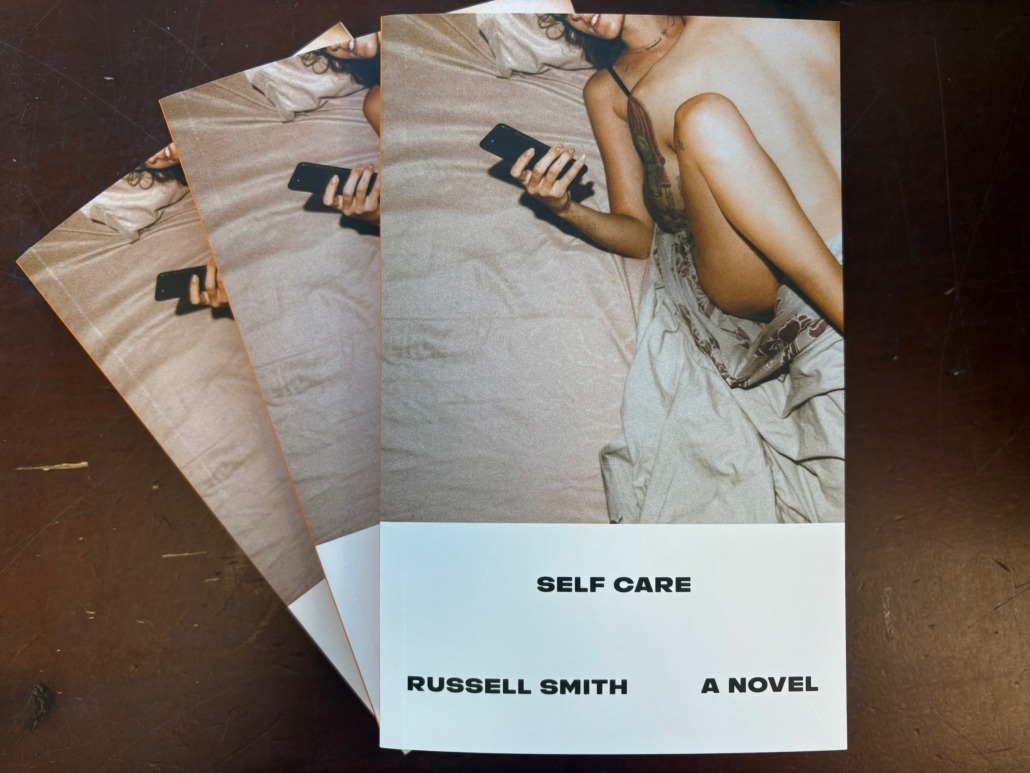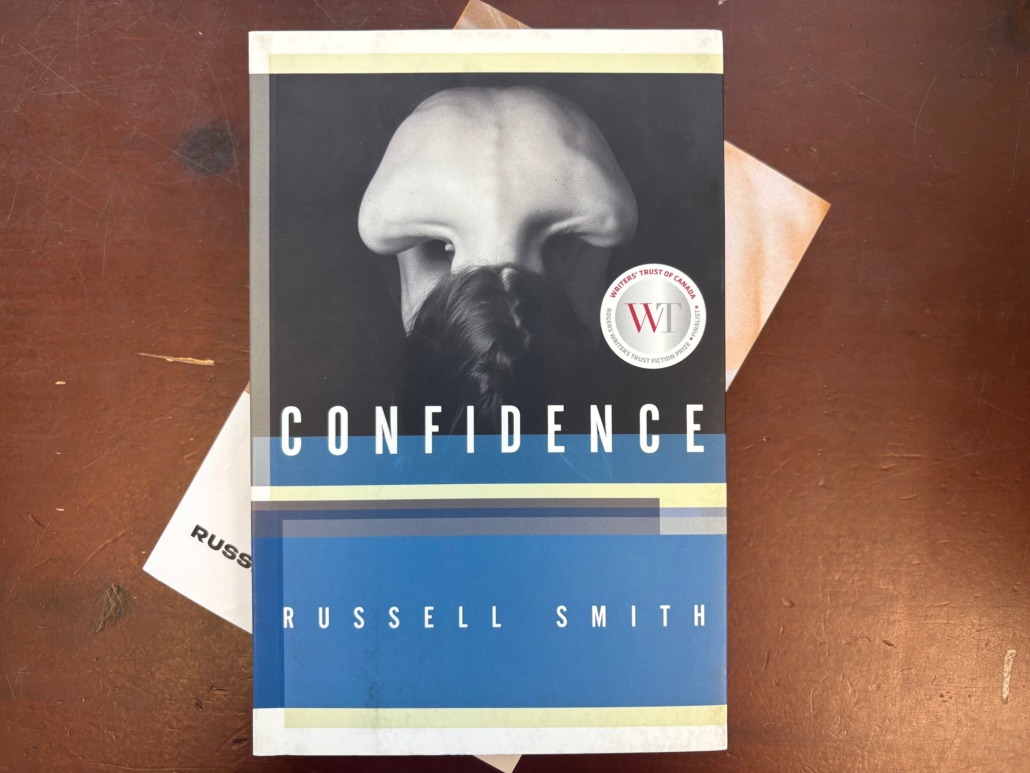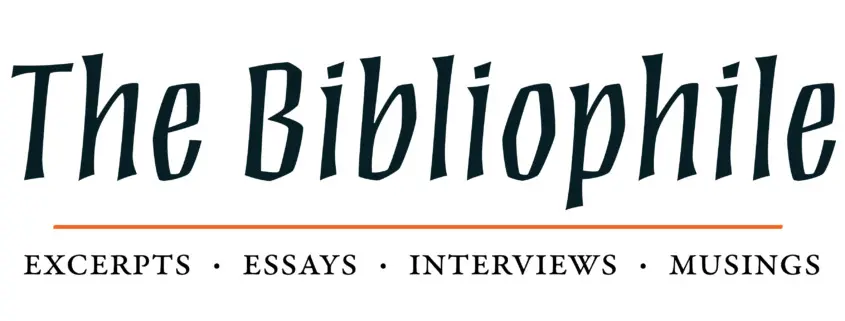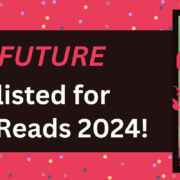The Bibliophile: The Scorpion and the Frog
Want to get new excerpts, musings, and more from The Bibliophile right away? Sign up for our weekly online newsletter here!
***
Next week is the Canadian publication of Russell Smith’s novel Self Care, his first book in a decade and first novel in fifteen years. Most of you may know Russell Smith as one of Canada’s sharpest satirists who first came on the scene with the Governor General’s Award–nominated novel How Insensitive (1994) and who followed it up with several more novels often poking fun at our contemporary culture. But my own introduction to Russell’s work was his last book, Confidence (2015), a collection of short stories about people in Toronto and their conflicting desires, loneliness, and disappointments. When I read it, I got hooked by his dialogue and his humour. I felt that each story had just the right balance of being both wickedly funny and rather sad, which, I think, is a lovely combination for a story to be.

Self Care is the long-awaited return of Russell Smith, and it is also somewhat of a departure from his earlier work. Here we still have that satirical edge and that perfect pitch dialogue, but it’s also a rather dark book focusing on the particular dissatisfaction affecting people today and the online communities and culture that enable it.
A provocative modern fable about sex and self-loathing, Self Care follows a young woman who, despite her better judgement, starts a relationship with an incel. It’s a dark twist on a love story (a “Romeo-and-Juliet tale for our cultural moment,” as Mark Kingwell put it), and a righteously funny and tragic novel about our desire to care and be cared for in return.
I got the chance to speak with Russell about his new book. Read on for that conversation.
Thanks for reading,
Ahmed Abdalla
Publicist
An Interview with Russell Smith
Could you start by telling me how Self Care came about?
This is my tenth book and it’s a departure for me in that it’s not about my life at all. It is from the point of view of a young woman and it’s about a world of people much younger than I am. I taught creative writing for several years and I was inspired by talking to lots of young people. I stayed in touch with my students after I stopped teaching in that MFA program, mostly through social media. I became fascinated by certain problems that they had that I didn’t have when I was their age. In many ways I wanted to write about what it’s like being young today in North America. The main pressures that I wanted to describe were financial ones that these young people with degrees in the humanities just have no idea how to make a living. There are very few options available to them.
Also, one of the things I noticed women talked about a lot online were frustrations with men and particularly with “cool” boyfriends who wouldn’t commit to relationships. But another thing that really struck me was a couple of women in private conversations with me started talking about incels and incel culture. A couple of women admitted to having a fantasy of taking one of these guys and showing them what a true relationship could be like and changing him. And I think that’s a fantasy that all of us have. The idea that I can change him. I thought that was maybe not such an uncommon fantasy, so I thought I would invent a story around it.
You said Self Care is a departure for you because it’s not really about yourself anymore. Is part of that why you chose to write from a woman’s perspective? Most of your previous work up to this point has been from a man’s perspective.
I just really wanted to write about what I was seeing among the young women who were in my own circle who struck me as quite sad. I wanted to describe a particularly contemporary kind of sadness. I also think people are less and less interested in men. I’ve written a lot about men and their sex drives. I’ve really played that out. I’ve done enough of that lustful man character.
And there are satirical elements, but it’s not a full-on satire. Just like my last book, Confidence, a collection of short stories, this is a more serious book than my early works.

How satirical did you intend this book to be? Because it makes fun of a lot of different people, but also gets quite serious as the story goes on.
It’s a dark book, but there’s humour in it. There are various contemporary milieux or situations that I just find ridiculous. Primarily my own milieu. Satire is always written by insiders. I’m writing about me and my friends often in everything I write. The targets of satire here are the kinds of people who work for online health journals and the reason that they have to write nonsense is that they’re not paid enough to do any actual research. They just repeat faddish ideas and trends.
Another thing that I’m making fun of is the obsession with mental health that young people in university environments have at the moment that seems to be encouraged by social media. What I mean by that is that everyone is encouraged to think of themselves as mentally ill. You’ve heard the word neurodivergent suddenly rise in popularity over the last five years, when ten years ago we never heard that word at all, and now every single sensitive person claims to be neurodivergent. I think it’s more salutary to realize that if everybody is neurodivergent, then nobody is. If you’ve ever suffered from depression or anxiety, and who hasn’t, you’re neurodivergent. But that just means you’re normal. Also, there’s a million quizzes you could do online to prove you have ADHD. Anyone can come up with these quizzes. If you take one of these quizzes the answer will always be that you have ADHD. People are desperate to identify as disabled in this way. I’m amazed by how thrilled people are with this diagnosis.
Suicide is also a big part of this book, and suicides of artists in particular. Why is that?
There was a weird period in my life a couple of years ago where there were a couple of suicides close to me, in a cluster, and that was just a coincidence. But that gave me the idea of an imagined epidemic of suicide of people in the arts.
There is a strange fixation with suicide in the culture right now. The more that people say you have to be sensitive and cautious about the idea of suicide and you have to put trigger warnings on top of anything that mentions it, the more the idea is brought up and discussed and you are creating one giant trigger. This is one of these paradoxes. It’s like the Streisand Effect. The more you say “Don’t mention the war” the more you mention the war.
Gloria lives in a world in which there are literal, physical signs everywhere about suicide. Some of those really exist. The Centre for Addiction and Mental Health in Toronto in the past did have big posters all over the city with the slogan “Not suicide. Not today.” I’ve quoted that in the book. So you’re trying to get people to be aware of the dangers of suicide and you’re putting up posters reminding people of the possibility of suicide all over the city. That struck me as paradoxical.
The idea that we should all be proud of being fragile and vulnerable, that we need to identify primarily with our limitations, that we need to label ourselves with them and notify everybody of them—this is a new pressure and I don’t think it’s healthy. The book is not an essay. I’m not lecturing anybody about anything. It’s a love story about two people that fails, but if we’re talking about the satirical aspects, I couldn’t help having fun with this.
Can you talk about how sex and intimacy has changed because of the internet? It seems as though all these characters are dissatisfied with their sex lives and they turn to the internet for something. Daryn with the incels and Gloria with her social media and wellness blog. But even they seem to get dissatisfied with that as the story goes on.
Daryn and Gloria’s dissatisfaction are very similar and they have similar complaints about the world, although their solutions are wildly different. Daryn is upset about income inequality, that he can’t get ahead. He works in a Best Buy and doesn’t come from a privileged class, so he has no advantages in the world. Gloria is preoccupied with the same things, just as her leftist friends are, but it’s just that Daryn’s solutions are different.
Daryn is dissatisfied and unhappy and so he turns to a community of unhappy men online for companionship, while Gloria is talking to women all the time who are disappointed in men because they’re on dating apps. The apps give everybody so many options that nobody’s willing to commit. Even the cool, sensitive, educated men that Gloria and her friends want to date, they know the right language, they know how to speak feminist language and they know the sensitive things to say, but they’re extremely insensitive about women. They like to have a bunch of women on the go at any time, and that makes all those women unhappy.
Although it should be pointed out that Gloria has refused to go on dating apps. Only her friend Isabel has been on the apps, but Isabel also posts a lot of sexy selfies. She has an anonymous Instagram account where she posts them and that’s simply for own self-esteem. She tends to post sexy selfies, as a lot of people do, when she is really down and lacking in self-esteem.

Why do you think more people are dissatisfied and unhappy?
The culture of the image is making people unhappy. The culture of competition around appearance is exacerbated by Instagram. It’s terribly unhealthy. There’s an instant gratification in being attractive. If you’re attractive and you’re having an attractive day, and I’m sure this applies to men too, you put an attractive photograph of yourself up and lots of people respond positively, it is validating and gratifying in the short term. There’s a little rush that comes with that that I’m sure can be very addictive but not fulfilling in the long run. And Daryn also needs validation from people to find that he’s not alone in feeling miserable and rejected and that the whole world hates him.
In a way they become isolated in their own online communities, where they get their insecurities or anger amplified. The more obvious one causing harm being that of the incels, but Gloria’s social media and online wellness culture can seem just troubling. Were you trying to compare the two?
Yes, and as I said Daryn’s concerns and Gloria’s concerns are very similar. They’re upset about inequality in the world, they’re both lonely and find it difficult to find loving, committed partners.
Now Daryn’s hasn’t really tried. He doesn’t try because that’s what incels are like. They don’t try and they’re subject to a kind of delusion. They feel they’re unattractive. I was inspired here by reading a lot and watching documentaries about incels. You can actually see some video interviews with young men who are incels online and they say “I’m so ugly. I’m unattractive.” And they’re absolutely normal looking guys. They’ve got a kind of body dysmorphia. They look in the mirror and they see someone ugly and the rest of the world doesn’t, but they’ve convinced themselves that they are ugly. They’re convinced that women don’t like them, but they don’t associate with women at all. They don’t know women. They don’t try, I think, for fear of rejection, for this decision that they’re not the right kind of guy. They don’t know women enough to know that women aren’t looking for what they think they’re looking for.
What links Gloria and Daryn is a sense of dissatisfaction with the world generally.
It’s almost like Daryn thinks his appearance is also out of his control too, similar to how he feels like he can’t get ahead financially. And Gloria starts her relationship with Daryn almost as an experiment in control, of wanting a sense of control because every other part of her life is in flux.
Control is a great word, because that’s the problem with both of them. They have no power in their lives. Gloria feels powerless in her career and her love life, and the same with Daryn.
Gloria doesn’t really know what she wants. She’s very confused. She doesn’t know why she’s going after Daryn. At first she thinks it’s just because she hates him and wants to punish him. But then she realizes she’s actually intrigued by the idea of a boy falling so helplessly in love with her. She tries to resist the idea, but it’s a very attractive idea since all of her hipster boyfriends have been unable to do that. She finds that there’s something in Daryn’s twisted worldview that is actually appealing to her and that’s the idea of traditional gender roles, his idea of a monogamous relationship in which a man takes care of a woman, like a knight and a princess. Something about that idea really lights up her brain because that’s the absolute opposite of what all the boys in her life were too cool to give her.
Now why did she start first having sex with Daryn? Well she wants sex, but she’s nervous about him. She doesn’t know if he could be an actual violent man. It’s funny enough, but the men who scared her with possibly violent acts during sex are all the cool, sensitive hipster boys. Those are the ones who know that some women like to be choked during sex and so they’ll do it without asking your consent. That’s how the novel opens. Gloria is really nervous about power imbalances in sex with someone who’s declared himself an incel. So she puts herself in the role of a dominatrix, which doesn’t come naturally for her. She’s not really turned on by the sex, but that’s the only way she can feel safe in having sex with him. But also, she wants to teach him a lesson. She’s mad because when she first saw him, he was participating in a neo-nazi, anti-immigrant demonstration. In her mind, she can’t separate the desire to love and the desire to punish. She wants control of him, and the only way she can do it is through this particular kind of sex.

Is there anything you would like people to take away from reading this?
That you read books just to find out what happens in the story, not to learn a lesson about anything. But if there’s any one message it’s possibly just that you can’t change people. In a way, Self Care can be seen as a modern retelling of the tale of the scorpion and the frog. Are you familiar with that?
No, I’m not. Can you explain it?
You’ve maybe heard some version of it with different animals, or sometimes it’s a young girl and snake, but it goes something like this with different variations depending on what people or animals are involved:
There’s a forest fire on one side of the river, and the scorpion wants to flee the forest fire by crossing the river, except he can’t swim. But he’s next to a frog who obviously can swim. The scorpion says to the frog “Listen, would you do me a big favour? Can you carry me on your back and swim me across the river?” and the frog says “Why would I do that? I know you’re dangerous and that you sting and kill frogs. You’re going to hurt me.” Then the scorpion says “No, absolutely not. Why would I do that? If I sting you as we are crossing then we both drown. So it wouldn’t help me. We both need to get out of here. Just do me this one favour and I’ll never harm you or your family as long as we live.” So the frog agrees. He puts the scorpion on his back and swims him across the river. As soon as they get to the other bank, the scorpion bites the frog and poisons him. As the frog is dying he says “Why on earth would you do that?” and the scorpion says, “You knew what I was when you picked me up.”
Sometimes the punch line is simply the line “It’s in my nature.” It’s a parable that applies to Gloria and the incel.
You don’t think Daryn could have ever changed?
No, I don’t. Daryn is messed up. He gives hints at his violence from early on, but she’s blind to them because she’s desperate for love. And we’ve all done that. We’ve all ignored red flags, and I’ve even been the red flag, and we all kick ourselves and say “What was I thinking?”
In good publicity news:
- Scout Magazine featured several Biblioasis titles in their Scout Book Club: Revolution issue:
- Precarious: The Lives of Migrant Workers by Marcello Di Cintio: “One of the most engrossing and activating books I’ve read so far this year . . . both thoroughly researched and deeply nuanced.”
- Voices of Resistance: Diaries of Genocide by Batool Abu Akleen, Nahil Mohana, Ala’a Obaid, and Sondos Sabra: “It’s impossible not to be moved by these devastating, honest human accounts dispatched from on the ground.”
- On Oil by Don Gillmor: “Gillmor covers an impressive amount of ground in this slim 134-page volume.”
- On Book Banning by Ira Wells: “A compelling and jam-packed argument against the banning of books . . . Long live literature and reading for pleasure!”
- The 2025 Seth’s Christmas Ghost Stories were featured in Guelph Today.
- We’re Somewhere Else Now by Robyn Sarah was reviewed in The Woodlot: “Robyn Sarah’s work is powerful, visceral, but also elegant and pared down when it needs to be . . . Her poetry collections are consistently lauded, and this one I believe will be no different.”
- Ira Wells, author of On Book Banning, wrote an op-ed in the Toronto Star on the ongoing Alberta censorship campaign.






